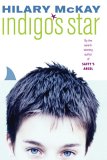Summary | Excerpt | Reviews | Beyond the Book | Readalikes | Genres & Themes | Author Bio

Chapter One
For the first time in his life Indigo Casson had been properly ill. He had
flu, and instead of getting better, it got worse and turned into infectious
mononucleosis.
"Mono?" asked his disbelieving classmates. "Or scared
stiff?"
Somewhere, at the back of his head, Indigo wondered the same thing. However,
it really was mono. He grew very ill indeed, quite quickly. Even at the worst of
his illness though, a part of Indigo sighed with relief. A part of him thought,
Phew!
At first it was quite exciting for his family,
having Indigo so ill. Anyone who asked any of the Cassons, "How's
Indigo?" received a very long answer. A much too long answer, with lots of
details most people would rather not know about.
Luckily, this stage did not last very long. Indigo's illness stopped being
news and became a fact of life. When people said, "How's Indigo?" his
family answered, "Fine," and talked of more interesting things. This
was not because they did not care about him, but just that there was nothing new
to say. Anyway, compared to how he had been, Indigo was fine. He could walk up
and down the stairs again. He could eat. He didn't keep fainting. He was fine.
Meanwhile, Indigo missed a whole term of school and grew extremely tall and
thin. He spent a great deal of time by himself. The house was very quiet during
the day. Caddy, his elder sister, was away at college. Eight-year-old Rose and
Saffron (his adopted sister) were at school. His father and mother, both
artists, were busy with their work, his father in London, and his mother in her
shed at the end of the garden. It was a peaceful time, but it gave Indigo an odd
feeling sometimes. As if, when he was alone, he became invisible. Once he looked
in the mirror and grinned at himself and said, "Still there!"
Some days Saffron brought him work home from school. Other times Indigo read
books or watched TV. Even so, he had hours and hours, especially at the start of
getting better, when all he did was lie stretched out on his bed, dreamily
watching the sky. He especially liked the clear days, when airplanes traveled
across the blue, unfurling white banners of jet trails behind them. Indigo
imagined them, full of people he did not know, journeying to places he had never
seen. Even when the planes were too high to see, the jet trail banners listed
their journeys across the sky.
Indigo thought that until he had become ill he had been on a journey of his
own. Not a plane journey, but still a journey. He had been a traveler through
the days and weeks and years of time.
Toward the end, Indigo's journey had become rather an unpleasant trip. Indigo's
time of peaceful invisibility was brought to an end by Rose. Rose had a habit of
pouncing on the phone at the first ring. One day she pounced, and it was her
father, Bill Casson, calling from London. Far away, in his immaculate studio,
Bill Casson heard a series of bumps. Bump, bump, bump, and then a thud.
"What on earth is that I can hear?" he asked, and Rose replied,
"Indigo."
"Whatever was happening to him? Has he hurt himself?"
"He was just jumping down the stairs."
"Jumping down the stairs?"
"Yes."
"Jumping?"
"Yes."
"Then he must be better," said Bill.
Later on, when Rose reported this conversation, everyone looked at Indigo. It
was true. He was better. Without anyone noticing, without noticing himself, he
had got well again. His journey through the days and weeks and years of time was
about to start once more. Indigo could hardly remember where he had been going
in those far-off, before illness, six-inch-shorter days.
Eve, Indigo's mother, said happily, "You are better, Indigo darling!
You will be able to go back to school!"
"Yes," said Indigo, and Rose wailed, "He still looks terrible
to me!" and everyone laughed.
Copyright © 2003 by Hilary McKay
He has only half learned the art of reading who has not added to it the more refined art of skipping and skimming
Click Here to find out who said this, as well as discovering other famous literary quotes!
Your guide toexceptional books
BookBrowse seeks out and recommends the best in contemporary fiction and nonfiction—books that not only engage and entertain but also deepen our understanding of ourselves and the world around us.